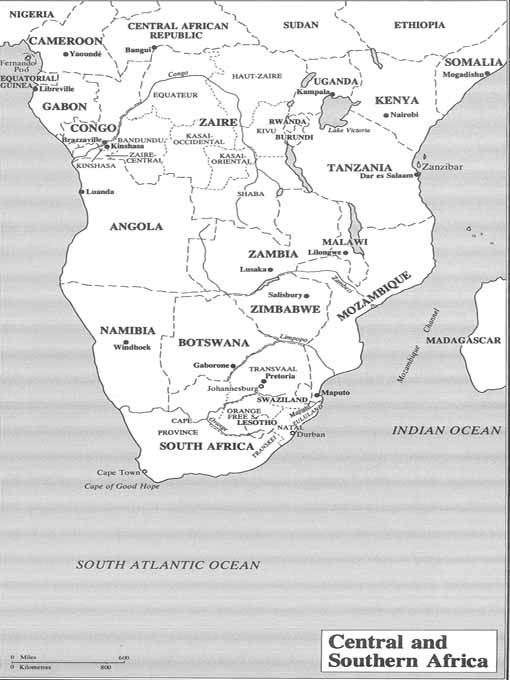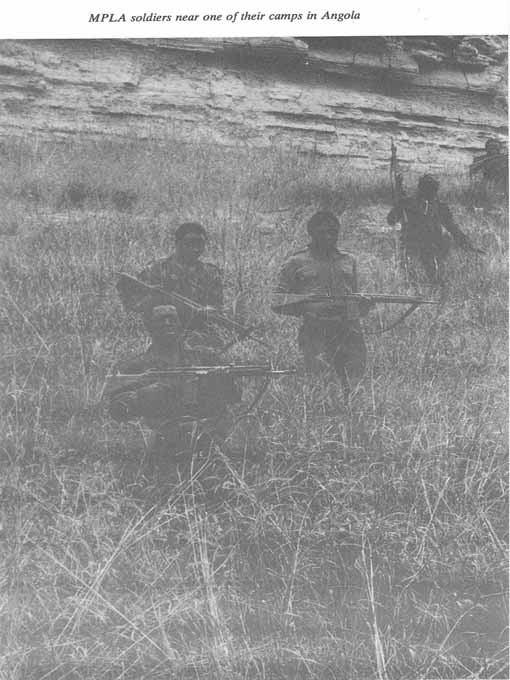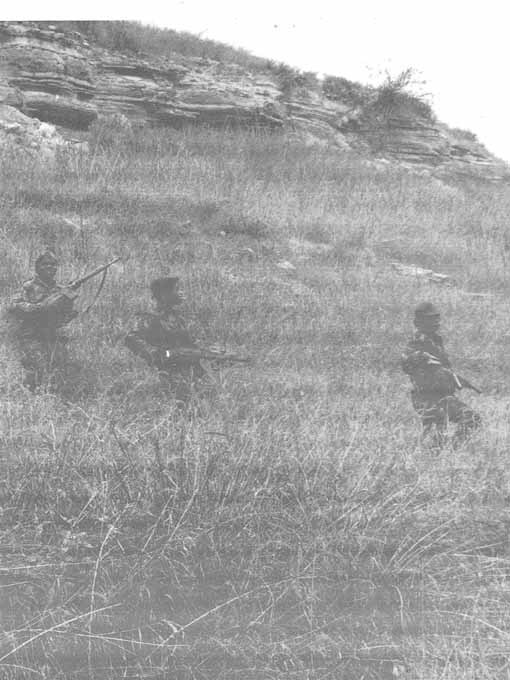The Third World War - The Untold Story (56 page)
Read The Third World War - The Untold Story Online
Authors: Sir John Hackett
Tags: #Alternative History

However reasonable Kwazulu's proposals might be and however much the ANC might be prepared to wait and see, no progress towards reform was possible except by the ruling National Party itself. But in the elections of the early 1980s, the National Party had not received a mandate for reform. Indeed, the far more extreme Herstigte National Party had gained support although it had won no seats in parliament. Yet within the country there was a growing body of liberal support for a programme of gradual reform. It was because of this, together with South African undertakings to open a 'new chapter' of relations with the United States (which would bring great economic benefits to South Africa), that the Prime Minister determined to embark on a programme of reform in 1983. There were other reasons for not leaving it any later. He wished to exploit what goodwill might be forthcoming from the valuable progress that had been made over Namibia. He was also conscious that by the end of the century the white South African population could not possibly provide all the skilled workers that would be needed. Above all, the Prime. Minister wished to avoid conflict.
He reconciled himself to the creation of a black middle class by training and education to fill higher posts in industry and government, to decentralized regional development to enhance the prosperity of the homelands, and to granting more political representation to non-whites in order to start a process of co-operation and consultation that would at length lead to responsible power-sharing. In this mood, he was at least prepared to consider what Chief Kwazulu had to propose. It was unfortunate that the Prime Minister's programme of
Verligtheid,
which could have led to genuine liberalism, was interrupted by the outbreak of war. The restraint so admirably exercised by the Arab states towards Israel was not displayed by the black front-line states in their actions against the Republic of South Africa. When war broke out the armies of Mozambique, Zimbabwe and Botswana, together with a largely SWAPO and Angolan force launched from Namibia, simultaneously invaded South Africa.*
·
See Sir John Hackett and others, op. cit., pp. 266-76.



Their unwillingness to forgo an advantage put back a solution to the injustices of apartheid many years, and the solution when it came was accompanied by violence.
Violence was no stranger to the African scene, as we shall see if we examine what was happening elsewhere during the early 1980s. Much of this violence had occurred because Libya had attempted to set up a Saharan hegemony to incorporate Chad, Niger and the Sudan, and even to link up with Ethiopia, so that Egypt could be encircled and isolated. Fortunately for Libya, and indeed for that part of Africa as a whole, things did not develop exactly as the Libyan leadership had planned. In the first years of the 1980s, however, if revolutionary zeal, large oil revenues, weak, irresolute or distracted neighbours and unlimited arms supplies from the Soviet Union could be said to be the right ingredients for indulging insatiable ambition, Libya was clearly on to a good thing. Chad had an army of three infantry battalions and a few guns and mortars; Niger had an even smaller army, but was still rich in uranium; Sudan, it was true, had respectably sized armed forces, but many of them were deployed in the troublesome southern areas of the country and to the east near the border with Ethiopia, both to maintain security there and to keep an eye on Eritrean guerrillas. In any event, Sudan's 250 tanks and forty combat aircraft looked puny enough compared with Libya's estimated strength of 3,000 tanks and over 400 MiGs and
Mirages.
Moreover the air mobility lent to Libya's twenty-five battalions of infantry, Pan-African Legion and Moslem Youth by the transport squadrons of
Hercules
aircraft and over 100 troop-lifting helicopters would make easy the concentration of superior forces against Sudan.
Libya had soon recovered from the temporary setback in Chad at the beginning of 1982 when the OAU peacekeeping force had replaced its own troops there. The Libyan regime persuaded those who controlled the principal Arab tribes in Chad to form an uneasy alliance with the leader of the main rebel forces in the eastern provinces near the Sudanese frontier. Thus with two of the three private armies on its side, Libya was still able to deploy some of its own troops at Abeche and continue to harass the Sudanese, all with a view to subverting the rule of Sudan's President. This subversion was directed not only from Chad but also from Ethiopia. To the west of Chad, Libya's sponsorship of the Tuaregs had resulted in continued fighting between its so-called Islam legions and Niger's small army.
All these manoeuvrings, designed to isolate Egypt and create Libyan hegemony over the Sahara, were brought to an end in 1983 as a result of action against Libya by Egypt itself which removed the Libyan military regime once and for all. The effect of its fall was generally beneficial. Libyan troops, who had not relished the experience or the prospect of being hideously and agonizingly mutilated by the savage tribesmen of Niger and Chad, were allowed to return home to the far more agreeable duties of garrisoning their own country. The Sudan-Chad border quarrels were patched up and the border itself policed by OAU patrols. Niger settled down under its military ruler, looking to Algeria and France for further assistance both with its security and its economy - indeed Libya's interference there had facilitated some degree of rapprochement between these two countries. Sudan was able to concentrate more on its internal difficulties in the south, while keeping an eye on the activities of Ethiopia and further cementing good relations with Egypt. Somalia's position was strengthened, while the Egyptian-Libyan axis, as we have seen in the last chapter, helped to give great impetus to growing Arab unity and a peaceful settlement in Palestine.
The great game between the superpowers of reassuring both their friends and themselves that they could be relied upon in times of danger or tension was still much in evidence in Africa during 1983. The continuing exercises by the US Rapid Deployment Force were of some comfort to Somalia and Sudan and were answered by comparable Soviet manoeuvres in South Yemen and Ethiopia. Much more serious was the Soviet build-up of arms and advisers in Mozambique, Botswana and Angola; indeed support for the latter was so extensive that some of it was clearly destined for Namibia. By 1984 there were some 10,000 Cubans in Mozambique together with increased numbers of Soviet and East German advisers. Botswana had contented itself with accepting technical and tactical experts from these two countries to help with the training of its own gradually expanding army, but it had also established in the north-east a number of training camps for ANC guerrillas who were being equipped with Soviet-supplied small arms, rocket launchers and mortars, together with hand-held SAM. In Angola the number of Cubans and East Germans had roughly doubled. Apart from their traditional tasks of manning sophisticated equipment and training the Angolan armed forces, they were now also involved in welding a large number of former SWAPO guerrillas, who had taken refuge in Angola after the Namibian independence negotiations got under way, into an all-arms force of roughly brigade size for future use in Namibia. These ominous advances in the front-line states' conventional and guerrilla capability - coming as they did at a time when the National Party in South Africa was running into more difficulties with its reform programme and ANC industrial sabotage was on the increase - did not augur well for southern Africa.
Zimbabwe, on the other hand - and this was consistent with its positive initiatives over Namibia - remained ambivalent in its attitude towards the Soviet Union. There were perhaps two reasons for this. One was the closer economic ties which Zimbabwe continued to seek with the West; the other was its association with China. China was willing to back any movement that would advance the struggle against apartheid, yet at the same time it wished to check Soviet influence in southern Africa generally. Quite apart from its special relationship with Zimbabwe, China was also on friendly terms with Mozambique and Angola, offering them limited aid and exploiting the inevitable frustrations and restrictions caused by the Soviet and East German presence in the two countries. In Zambia and Tanzania, too, China was able to build on earlier friendly co-operation, while in Namibia it gave strong support to Western initiatives to bring about a settlement. Despite all China's friendliness, however, Soviet influence in southern Africa's black states remained paramount.
The same could not be said of west Africa. In 1981 Equatorial Guinea had rebuffed the Soviet Union's attempts to reinforce its footholds there and had, moreover, invited the country's former colonizers, Spain, to return and help with the re-organization of the army, the economy and constitution. The USSR had suffered comparable setbacks in two former Portuguese colonies, Guinea-Bissau and the Cape Verde Islands. France, meanwhile, felt able to swallow some of its socialist-inspired disapproval for the more despotic behaviour of dictatorships in French-speaking west Africa and pledged continued military and economic assistance to the Ivory Coast and the Central African Republic. Perhaps the most encouraging developments of all had been those in the western Sahara. The withdrawal of Libyan aid to the
Polisario,
continued Saudi Arabian economic props for Morocco, and the OAU's refusal to recognize the Saharan Arab Democratic Republic, all made for compromise, and a solution was at last agreed during 1983 between Morocco, Mauritania, Algeria, and the
Polisario
itself. The idea of a separate and independent Saharan state was abandoned, or at any rate postponed. Instead, federation with Mauritania of much of the disputed territory won the day.
Nigeria and Zaire were two other countries in Africa where Western anxiety for moderation and cohesion did much to reconcile them to the necessary price that had to be paid - substantial foreign loans to these countries. Nigeria's problem was one of reduced oil exports and thus revenues. This made the import of sufficient food, which constituted more than half of all imports, very difficult. A reduction in imports had in the past inflated prices disastrously. It was essential for the civilian government's success in the 1983 elections that there should be neither food shortages nor crises over prices. Its broad programme for alleviating these difficulties was a conventional one - cuts in government spending, delay in satisfying creditors abroad, general austerity in federal and state allowances, abandonment of new projects. These measures alone were not sufficient, but combined with sensible progress towards a sound oil policy and proper loan guarantees they did much to make possible the necessary borrowing on the international market.
Zaire's political instability arose not only from the need for international monetary credit - indeed this need had been temporarily taken care of by the enormous IMF grant of $1 billion spread over three years. It had arisen from dissatisfaction with the former President's tyrannical methods and his inability to cure the unrest in Shaba and, worse, in Kivu where the Parti Revolutionnaire Populaire pursued its guerrilla campaign against central authority. The new President, however, was able to reassure both the President of France and Belgium's Prime Minister to the extent that they felt able to cooperate more fully both militarily and economically.
